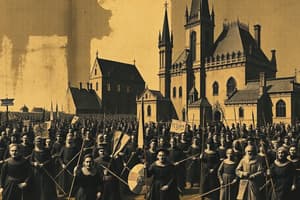Podcast
Questions and Answers
What was one of the significant outcomes of the heavy rain in the spring of 1315 CE across Europe?
What was one of the significant outcomes of the heavy rain in the spring of 1315 CE across Europe?
- It led to the escalation of the Hundred Years' War.
- It resulted in the signing of the Great Charter.
- It caused heavy floods and contributed to the Great Famine. (correct)
- It initiated a population growth period.
How did the Black Death influence the social structure in Europe?
How did the Black Death influence the social structure in Europe?
- It increased religious adherence among the population.
- It eliminated the concept of feudalism.
- It resulted in a decrease in urbanization.
- It improved living standards due to increased wages. (correct)
Which of the following accurately describes the outcome of the First Hundred Years' War?
Which of the following accurately describes the outcome of the First Hundred Years' War?
- It established a new ruling dynasty in England.
- It ended with the signing of the Treaty of Paris. (correct)
- It was concluded with a permanent peace treaty.
- It greatly diminished the power of the monarchy.
What were the circumstances surrounding the signing of the Magna Carta?
What were the circumstances surrounding the signing of the Magna Carta?
Which environmental change was associated with the Great Famine in Europe during the 14th century?
Which environmental change was associated with the Great Famine in Europe during the 14th century?
What is the significance of the period from 1159 CE to 1259 CE in European history?
What is the significance of the period from 1159 CE to 1259 CE in European history?
What was a primary consequence of the Great Famine in Europe?
What was a primary consequence of the Great Famine in Europe?
What rights did the Magna Carta primarily aim to protect?
What rights did the Magna Carta primarily aim to protect?
What led to King John’s conflict with the barons resulting in the Magna Carta?
What led to King John’s conflict with the barons resulting in the Magna Carta?
What was one of the impacts of the Black Death on European society?
What was one of the impacts of the Black Death on European society?
Study Notes
First Hundred Years’ War
- The term refers to the conflict spanning from 1159 CE to 1259 CE.
- England faced significant challenges due to frequent internal and external wars during this period.
- The war was characterized by territorial disputes and power struggles between England and France.
Impact of the Black Death
- The Black Death, or Bubonic Plague, had devastating effects on Europe, resulting in the death of approximately 200 million people.
- Economic repercussions included damage to food grain supplies and subsequent famine across Europe.
- The epidemic also led to social changes, including labor shortages that improved wages for surviving workers.
Magna Carta
- Signed in 1215 by King John of the Plantagenet dynasty to protect the rights of landowners (Barons) in England.
- The charter aimed to limit the powers of the king and establish certain legal rights.
- Disregard for the Magna Carta's rules prompted landowners to rebel against King John's authority.
Great Famine
- The Great Famine in Europe was exacerbated by climatic changes, resulting in adverse weather conditions like heavy rains in the spring of 1315 CE.
- Damage to agricultural productivity contributed significantly to food shortages and economic instability.
- Internal strife within England further weakened the nation, making recovery from the famine more difficult.
Treaty of Paris
- The conflict known as the First Hundred Years' War concluded with the signing of the Treaty of Paris.
- This treaty involved discussions and agreements between King Henry III of England and King Louis IX of France.
- The treaty's provisions represented a crucial point in the historical relations between the two nations.
Richard the Lionheart
- Plantagenet ruler Richard earned the title 'Richard the Lionheart' due to his reputation as a great warrior and leader.
- His military prowess and valor were well recognized during his reign, forging his legacy in history.
Climatic Conditions and Epidemics
- The period experienced substantial climatic changes, including cooling trends referred to as 'The Little Ice Age,' impacting agricultural yields.
- The combination of these climatic challenges and the Bubonic Plague had severe demographic and economic effects throughout Europe.
Studying That Suits You
Use AI to generate personalized quizzes and flashcards to suit your learning preferences.
Description
Test your knowledge on the period known as 'The First Hundred Years' War' from 1159 CE to 1259 CE. This quiz covers important events and impacts in European history, including the implications of internal wars and the Black Death. Challenge yourself and learn more about this pivotal time in history.




